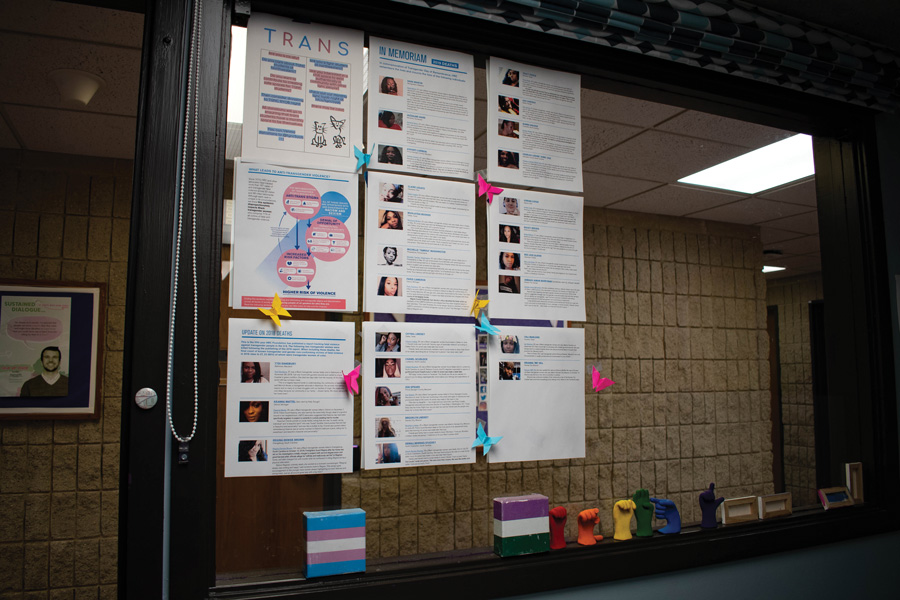MSA vigil memorializes deaths of transgender individuals
Alison Albelda/Daily Senior Staffer
The windows of the Gender and Sexuality Resource Center displays the faces of 22 transgender individuals lost to transphobic violence in 2019. A small group gathered at Norris University Center for Transgender Day of Remembrance.
November 21, 2019
In 2019 alone, at least 22 transgender people — mostly black women — were killed due to anti-transgender violence, and two more deaths are still being investigated for discriminatory intent, according to the Human Rights Campaign Foundation.
Multicultural Student Affairs hosted its annual vigil Wednesday at the Gender and Sexuality Resource Center for Transgender Day of Remembrance to memorialize murder victims of transphobia.
A group gathered at Norris University Center to engage in a moment of silence and read aloud the names of victims of transphobic violence, including Bailey Reeves, a 17-year-old black transgender woman who was the youngest to die this year, along with Paris Cameron, a black transgender woman among three-people killed in an anti-LGBTQ shooting in Detroit.
Students also folded origami butterflies to decorate the GSRC’s window alongside photographs and descriptions of the anti-transgender violence victims. Adam Davies, a SESP senior who has attended the event for the last four years, said Northwestern needs to do more to create a safe environment for transgender, nonbinary and gender non-conforming students.
“It’s really important on a campus like ours to recognize all of the trans people and specifically women of color who have died,” Davies said. “Recognizing this is important because (in the) 365 days out of the year… cis people and Northwestern as a university don’t recognize trans people.”
Davies, who is transgender and nonbinary and serves as the executive vice president of the Associated Student Government, said the University doesn’t provide basic necessities for transgender students such as all-gender restrooms in certain campus buildings and does not collect statistics on transgender populations.
Davies added they often feel obligated to advocate on behalf of other students who feel unsafe to speak out. Through their role, Davies has authored resolutions to project the transgender flag onto Deering Library and to create a university database system of preferred pronouns and names.
This year marks the 20th anniversary of the Transgender Day of Remembrance. Transgender activist Gwendolyn Ann Smith established the observance in 1999 to honor the death of Rita Hester, a transgender woman who was killed the year before.
Students who attended the event said despite increasing recognition of trans identity over the past two decades, transgender people continue to be far underrepresented at Northwestern and around the world.
About 3 percent of undergraduate respondents recently surveyed by the ASG analytics committee indicated they identified as transgender, nonbinary or gender nonconforming and 0.6 percent of the U.S. population identifies as transgender, according to the Williams Institute, a policy think tank at the University of California, Los Angeles.
“It’s just a really important event to be at to recognize the experiences of trans people and how it’s something that it’s wildly underrepresented especially on this campus,” Alyssa Peterson, a Weinberg junior said.
Peterson also noted the small turnout of the event and said the University should host LGBTQ-focused events more often.
Northwestern’s 2019 Campus Climate Survey showed undergraduate trans, genderqueer, or nonbinary and questioning students experienced disproportionately higher rates of sexual harassment, intimate partner violence, stalking and nonconsensual contact.
Matt Abtahi, assistant director for LGBTQ issues at MSA, said the murders of transgender people each year prompts continued reflection and remembrance. People are still complicit in violence and microaggressions against transgender individuals, Abtahi said, and silence only further normalizes anti-transgender rhetoric.
“Transphobic violence happens at all levels,” Abtahi said. “Today is not only a space of remembrance but also space for us to hold the mirror to ourselves and be mindful for the community we want to be building.”
Email: [email protected]
Twitter: @yunkyomoonk


